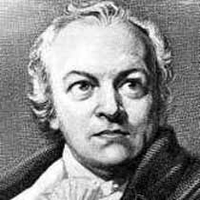William Blake - Biography and Works
William Blake was an engraver, a painter and a poet. A self-taught man, he wrote poetry which he himself painted and illustrated. As a mystic and a visionary, he expressed himself in simple language so that readers could feel the depth of common everyday things.

William Blake (1757-1827)
This is especially true of The Songs of Innocence (1789) and The Songs of Experience (1794) which are two important works that describe what the poet calls “two contrary states of the human soul.” Fallen from a state of innocence to a state of experience, man must attempt to rise to a state of higher innocence according to the poet.
Blake was born in London and lived most of his life there. He was a book illustrator and engraver by profession. He claimed to have seen visions, beginning in his childhood, and he called many of his poems either visions or prophecies. Blake has received much praise for such pictures as his illustrations for the Book of Job, but he was most interested in his “illuminated printing.” This was a process of engraving poems and related pictures on metal plates and then hand coloring the prints made from them. Except for Poetical Sketches (1783), most of Blake’s published poetry appeared in this unique form.
Blake is best known for Songs of Innocence (1789) and Songs of Experience (1794). In these works, he shows, in such contrasting poems as “The Lamb” and “The Tiger,” symbols of what he calls “the two contrary states of the human soul.” His other works include The Marriage of Heaven and Hell (about 1793), America (1793), and Jerusalem (about 1820).
Blake thought that we have war, injustice, and unhappiness because our way of life is founded on mistaken beliefs. We cannot, truly know reality through our five senses, yet we concern ourselves almost entirely with scientific truth and materialistic values gained through those very senses. We cannot understand the vast reality beyond the material and achieve full control of ourselves until we learn to trust our instincts, energies, and imaginations. For Blake, this belief was the basis of all personal, social and religious truth.
Blake was a non-conformist in every way. Somehow he came to hate the authorities to the extent that he called the king (politics) the priest (religion) and landlord (society) the three worms that eat into and rot man’s relation with man, God and the nature respectively. Blake rejected and despised any codified system or institution, including even marriage, which he called a kind of lifelong legal rape! He believed only in the pure spiritual and imaginative man, the original man or the visionary poetic being whose individual liberty and personal vision of true life can only become the basis of an ideal society: change and goodness of the society are not compatible with the codified artificial ideas and pretensions; culture must be the sum totality of the individuals’ real inward goodness and such behaviors, relations and practices. This vision could be the result of a sensitive man’s frustration against a most shallow and artificial society of the 18th century England (which Pope ridiculed in his satires). For Blake, the man had fallen from his creative imagination, spiritual status in the realm of reason, science and dead rationality where human values were lost in the confusion (forest) and ignorance (night) of actual spiritual, visionary and creative understanding of life.
Blake had been called a pre-romantic because he rejected the neoclassical literary style and modes of thought and anticipated the English Romanticism in both form and content of poetry. Always stressing imagination over reason, he felt that ideal forms should be constructed not from observation of the external nature but from inner visions. Blake is a true Romantic poet not only because he takes us to Nature and to the freedom and joy of the human soul, to the primary imagination and inspiration or to lyricism, but chiefly because his voice is the voice of a singular individual. The songs of innocence and experiences are poems of a man with a profound interest in humor, emotions and profound knowledge of them.
Cite this Page!
Sharma, K.N. "William Blake - Biography and Works." BachelorandMaster, 24 Nov. 2013, bachelorandmaster.com/biography/william-blake.html.
Related Topics
The Tyger from Songs of Experience
The Lamb from Songs of Innocence
England! Awake! Awake! Awake! from Jerusalem
The Sick Rose: Summary and Analysis
 |
bachelorandmaster.com |